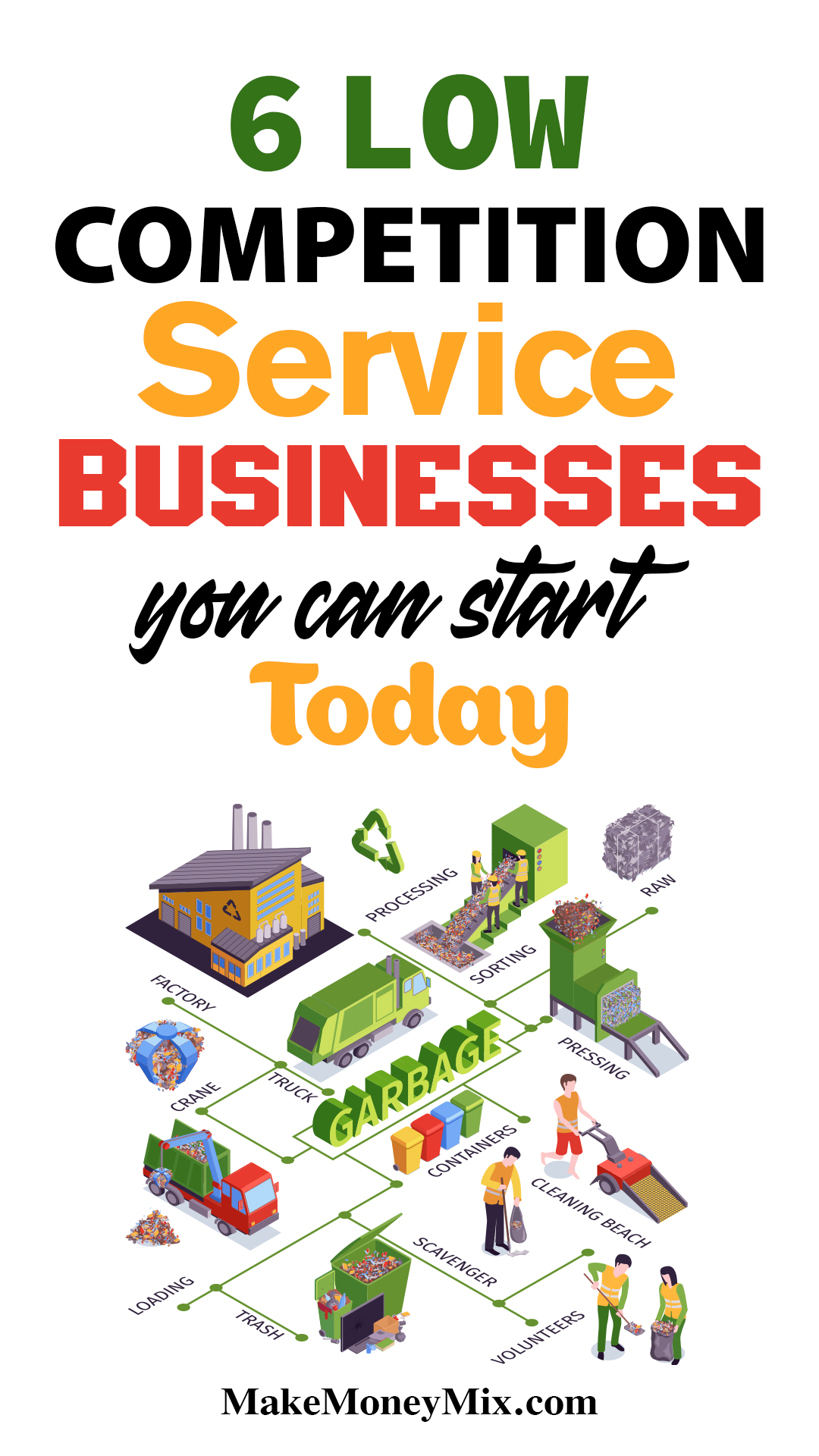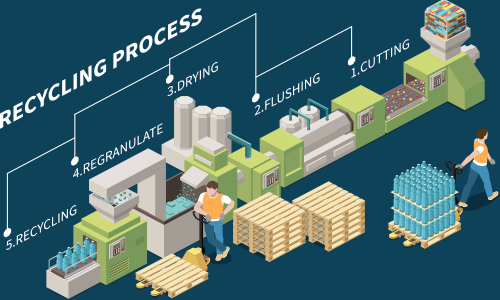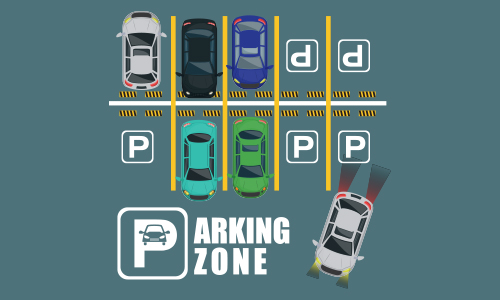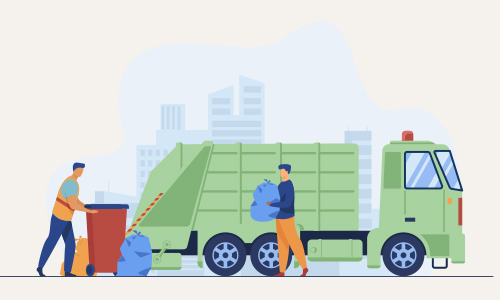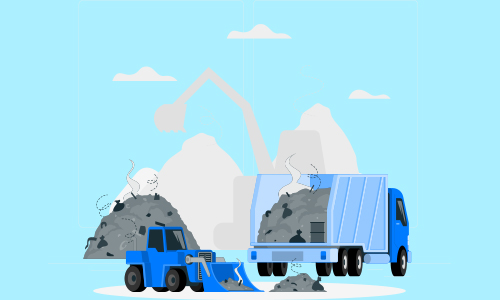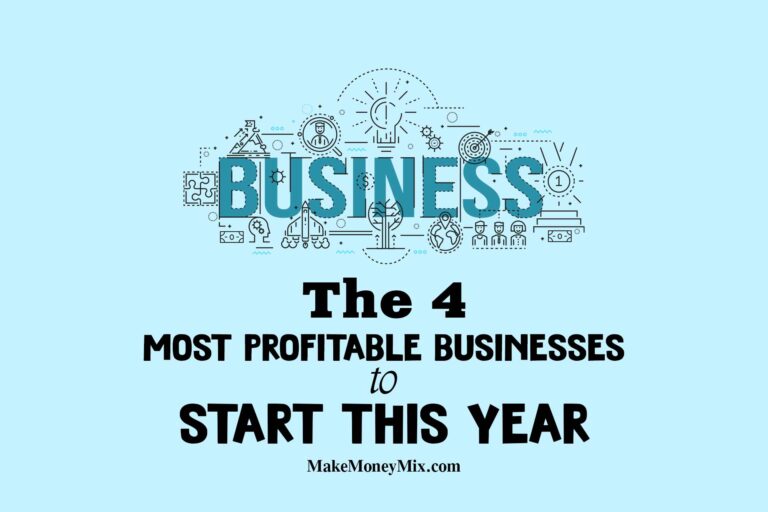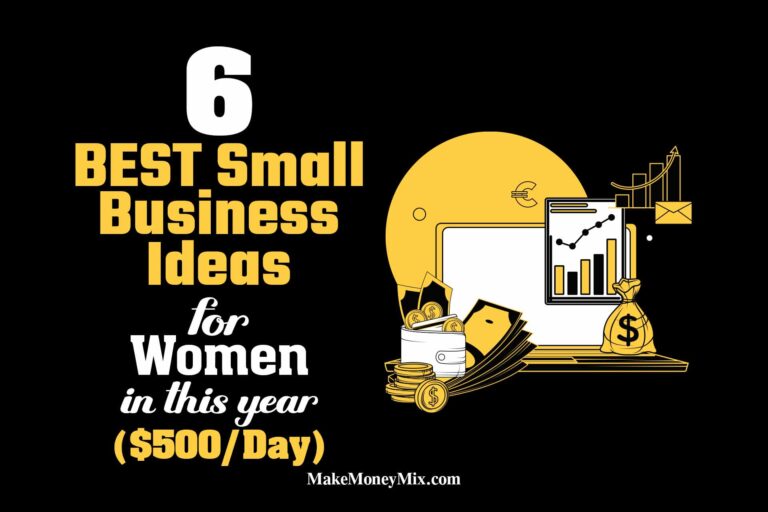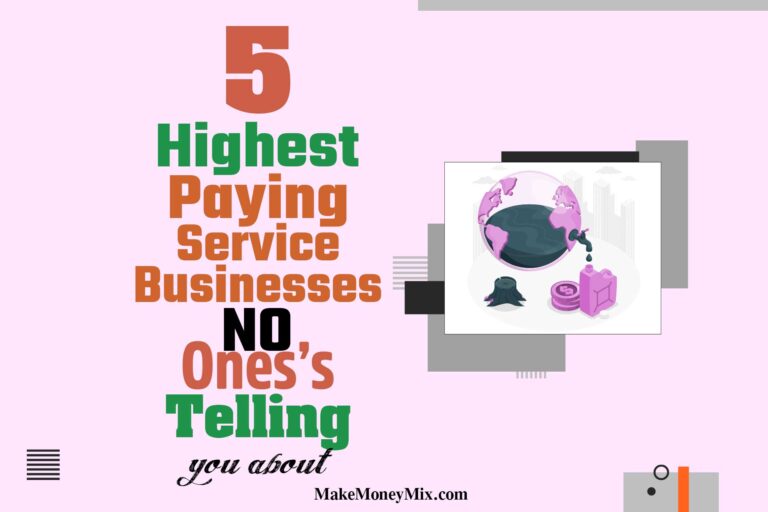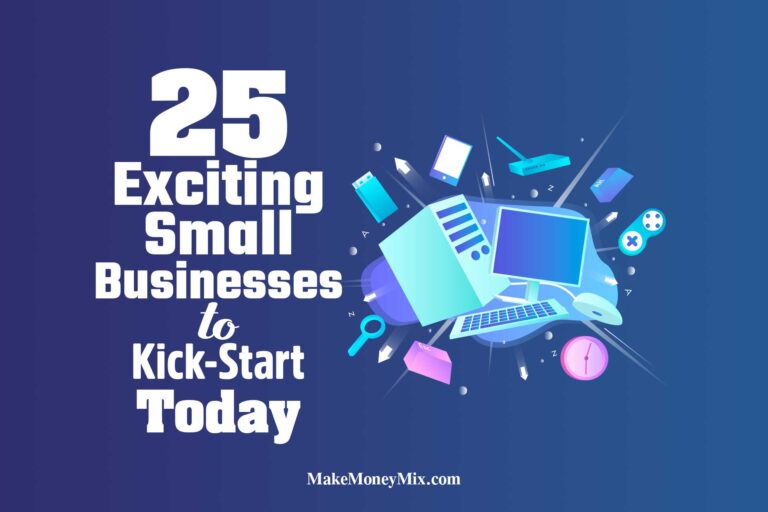6 Low Competition Service Businesses You Can Start Today
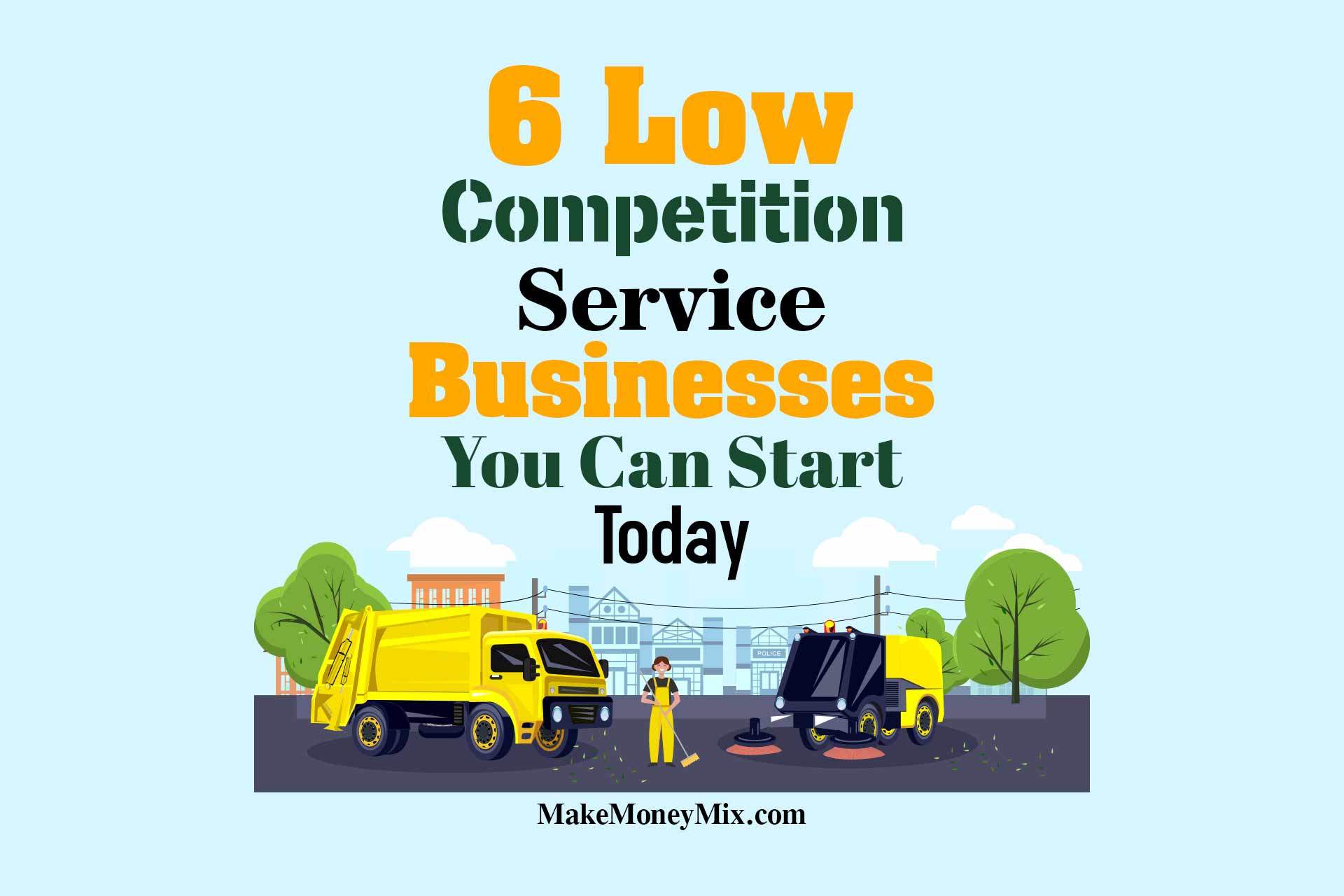
You might think starting a service business requires a lot of tools and equipment, right?
That’s not true at all!
If you own a pickup truck and have some business sense, you’re already equipped with the foundation to launch a profitable side hustle.
Whether you’re looking to be your own boss or just need a way to bring in extra cash during slow seasons, there are simple, scalable businesses you can start with minimal investment.
With just a little time, effort, and dedication, you can build something that generates real income and has the potential to grow as big as you want.
6 Simple Businesses You Can Start with a Pickup Truck
In this post, I will break down six business ideas you can start with your truck, including the startup costs, earning potential, and how easy it is to get started.
You might be surprised by how affordable and accessible some of these opportunities really are.
So, let’s dive in and explore which one could be the perfect fit for you.
What Every Service Business Needs
Before you jump into any service business, there are three essentials you need to set yourself up for success:
Customer Management & Payments
You need a reliable way to keep track of your customers, send professional estimates and invoices, and get paid quickly.
Free CRM tools like Quote IQ can handle all of this for you, and they scale as your business grows.
Plus, collecting customer reviews is crucial for building trust. Tools like the Review Multiplier in Quote IQ can increase your chances of getting reviews by 68%.
Business Insurance
Protecting yourself with business insurance is absolutely essential.
It’s easy to assume nothing bad will happen, but accidents, property damage, or lawsuits can strike anyone.
Without insurance, your business and even your personal assets could be at risk, potentially wiping out everything you’ve worked for.
Getting Customers Fast
No business survives without customers. To reach people quickly and stand out, consider using video ads.
Custom video ads can be delivered in minutes and posted across social media to maximize your reach and generate leads immediately.
Covering these three bases gives you the foundation to launch and grow your service business confidently.
1. Pallet Recycling and Reselling
Pallet recycling and reselling involves collecting used or discarded pallets from local businesses.
You can get pallets from nurseries, hardware stores, or any company that receives large shipments.
Once you have collected them, you can sell them to buyers who need pallets for shipping or storage.
The focus here is on the scavenging model, which means picking up pallets in usable condition and reselling them rather than spending time and effort repairing or dismantling them for wood.
This business is about turning what others consider trash into profit, leveraging your pickup truck to transport and deliver the pallets.
Startup Costs
The startup costs for pallet recycling and reselling are minimal, especially if you already own a pickup truck. You may need:
- A pair of gloves for handling pallets
- Possibly a trailer for larger loads
- Fuel for transportation
If you already have a truck, your financial risk is almost nonexistent.
Even if the business doesn’t work out, your loss is negligible, mostly your time and a small amount of money for supplies.
Potential Earning
While pallet recycling isn’t likely to make you rich, it offers a steady side income.
The scalability is moderate, like 4 out of 10, unless you expand into related areas like distribution, delivery, or wood pelletizing.
You can earn consistent money by selling pallets to original suppliers, manufacturers, or even individuals on platforms like Facebook Marketplace.
The key is volume and efficiency: the more pallets you can collect and resell, the better your returns.
How to Start
Secure a Source: Identify local businesses that regularly receive shipments on pallets and are willing to give them away or sell them cheaply.
Find Buyers: Contact original pallet suppliers (who often buy back pallets in good condition), local manufacturers, or list pallets for sale on Facebook Marketplace and similar platforms.
Collect and Deliver: Use your pickup truck (and trailer, if needed) to transport pallets from the source to your buyers.
Test the Market: Start small, see how quickly you can turn over inventory, and build relationships with both suppliers and buyers before scaling up.
Tips for Success
Focus on Scavenging: Avoid salvaging (repairing or breaking down pallets) as the quality of wood is poor, and the effort is rarely worth the return.
Do Your Groundwork: Make sure you have both a reliable source for pallets and buyers lined up before collecting large quantities.
Look for Value in “Trash”: Always look for items businesses consider waste, but others may find valuable. This mindset can lead to other profitable opportunities.
Consider Expansion: To scale, explore related services like pallet delivery, distribution, or investing in equipment to pelletize wood for resale to manufacturers.
Network: Building relationships with local businesses and buyers is crucial for a steady supply and demand chain.
Starting with minimal investment and focusing on efficiency, pallet recycling and reselling is a practical, low-risk way to generate extra income with your pickup truck.
2. Event Chair and Table Rentals
Event chair and table rentals involve providing essential furniture for gatherings such as weddings, parties, graduations, and corporate events.
As the hosts of these events, they often need temporary seating and tables.
Your business supplies and delivers these items for a fee.
You can start small with basic folding chairs and tables, and as your business grows, expand into offering decorative seating, premium tables, tents, linens, or even full event planning services.
This business is straightforward, highly scalable, and can be a steady source of income throughout the year.
Startup Costs
The initial investment for a small inventory of chairs and tables typically ranges from $1,000 to $2,000.
Folding chairs cost around $20–$50 each, and tables range from $40–$100 each.
You’ll also need a place to store your inventory, such as a garage, shed, or rented storage unit, which helps keep overhead low.
If the business doesn’t succeed, the equipment retains much of its value and can be resold, minimizing your financial risk.
Potential Earnings
A small setup can generate between $500 and $1,000 per event, depending on the size of the rental and the services offered.
The first few jobs can often pay off your initial investment. As demand grows, you can expand your inventory and services, increasing your earning potential.
Commercial clients and wedding venues can provide steady, high-value contracts, allowing the business to scale into a six-figure operation.
Some entrepreneurs have scaled similar businesses to millions in annual revenue by expanding into related services.
How to Start
Acquire Inventory: Start with versatile basics like folding chairs and tables that suit various event types. Purchase from reputable suppliers to ensure durability and ease of maintenance.
Secure Storage: Use a garage, shed, or affordable storage unit to organize and protect your inventory.
Market Your Business: Advertise on Facebook Marketplace, Nextdoor, and LinkedIn to reach local customers and corporate clients. Build a simple website and use social media to showcase your offers.
Network Locally: Partner with event planners, photographers, and venues to get referrals and recurring bookings. Word-of-mouth and professional relationships are key to steady growth.
Set Pricing and Policies: Establish clear rental rates, delivery fees, and terms of service. Consider offering setup and breakdown services for additional revenue.
Maintain Your Equipment: Clean and inspect all items after each use to ensure quality and longevity. A well-maintained inventory preserves your reputation and reduces replacement costs.
Tips for Success
Start Small, Scale Smart: Begin with the most requested items and reinvest profits into expanding your inventory. Add specialty items only after achieving baseline profitability.
Focus on Quality: Invest in well-made furniture that can withstand repeated use and transport. Customers notice the difference, leading to better reviews and repeat business.
Build Relationships: Networking with event professionals and venues can provide steady referrals and larger contracts.
Diversify Offerings: As you grow, consider adding linens, tents, or event planning services to increase your average order value and appeal to a broader range of clients.
Leverage Technology: Use rental management software to streamline bookings, track inventory, and manage payments efficiently.
Event chair and table rentals are a practical, low-risk business that can be started with modest investment and scaled as demand grows.
With strong local marketing, quality service, and smart expansion, this business can become a reliable source of income and even a full-time venture.
Also Check: 5 Incredibly Simple Service Businesses You Can Start for UNDER $1,000
3. Paint Striping (Parking Lot Striping)
Paint striping, also known as parking lot striping, involves marking lines, symbols, and signage on parking lots to designate parking spaces, accessible stalls, arrows, fire lanes, and other important areas.
This service is essential for businesses, schools, medical centers, and government facilities, as they are legally required to maintain clear and compliant markings.
The work can range from restriping faded lines to laying out entirely new lots, and it often includes compliance with regulations such as the Americans with Disabilities Act.
Startup Costs
You can start a parking lot striping business with basic equipment like paint rollers, tape, and paint for under $500.
This allows you to take on small jobs and test the market before making a larger investment.
As you grow, you can reinvest profits into a professional paint striping machine (such as a Titan Line Lazer, which costs around $7,500) for greater efficiency and profitability.
Other startup expenses include basic safety gear, insurance, and potentially a trailer or enclosed van for transporting equipment.
If you already own a pickup truck, your initial costs remain low.
Potential Earnings
Parking lot striping offers high profit margins, typically in the 60–70% range.
Most jobs pay between $300 and $1,000, depending on the size and complexity of the lot.
Some stripers report earning $3,000 on their first two jobs, quickly recouping their initial investment.
With recurring commercial contracts and the potential to expand into larger projects, this business can scale to a full-time operation with significant income potential.
How to Start
Get Basic Equipment: Use hand rollers, tape, and quality paint for small jobs. As you gain experience and clients, upgrade to a professional striping machine.
Learn the Trade: Study pavement striping techniques and local regulations, especially for accessible parking compliance.
Market Your Services: Start by cold calling paving and sealing companies and contact any business with a parking lot. Use free platforms like Facebook Marketplace and Nextdoor to advertise.
Network: Build relationships with local contractors, property managers, and facility owners to secure recurring work.
Reinvest and Scale: Use profits from initial jobs to purchase better equipment and expand your service area or team.
Tips for Success
Start Simple: Don’t over-invest at the beginning. Use basic tools to get your first jobs and learn the business.
Focus on Compliance: Ensure all markings meet legal standards for safety and accessibility—this builds trust and repeat business.
Leverage High Margins: Keep the overhead low and take advantage of the high profit margins typical in this niche.
Expand Services: As your reputation grows, add complementary services like crack sealing or pressure washing for additional revenue streams.
Build Recurring Revenue: Target businesses and institutions that require regular maintenance for steady, repeat income.
Paint striping is a scalable, high-margin business that can be started with minimal investment and grown into a profitable venture, especially when combined with other pavement maintenance services.
4. Commercial Cleaning
Commercial cleaning involves cleaning services for businesses, offices, schools, gyms, daycares, and other commercial properties.
Unlike residential cleaning, this business focuses on maintaining the cleanliness and hygiene of workspaces, which is essential for both employee well-being and client impressions.
Services typically include dusting, vacuuming, trash removal, restroom sanitation, and sometimes more specialized offerings like floor waxing, carpet cleaning, or post-construction cleaning.
This industry is known for its consistent workflow, low risk, and high potential for recurring contracts, making it a stable choice for entrepreneurs with a pickup truck and a willingness to work hard1.
Startup Costs
Starting a commercial cleaning business is very affordable compared to many other ventures. Basic cleaning supplies can be purchased for under $500.
These include vacuums, mops, cleaning solutions, and dusting supplies.
Licenses and permits typically cost between $100 and $500, while advertising can be done for as little as $100–$200 using online and print marketing.
If you already own a pickup truck, your transportation costs are minimal. Overall, you can expect to spend between $2,000 and $6,000 to get started, depending on the scale and the services you plan to offer.
Equipment can be resold if the business doesn’t work out, so your financial risk is low.
Potential Earnings
Commercial cleaning offers strong earning potential, especially as you scale.
Small operations can expect to make between $30,000 and $50,000 annually, while hiring additional staff and expanding services can increase profits to $70,000.
By offering specialized services like carpet cleaning or floor waxing, annual revenue can reach up to $100,000.
Average cleaning jobs for small offices range from $200 to $500 per visit, and specialized services can bring in as much as $5,000 per project.
The real advantage is the recurring nature of commercial contracts, which ensures steady income throughout the year.
How to Start
Get Basic Supplies: Purchase essential cleaning equipment and supplies for under $500.
Register and Insure Your Business: Obtain the necessary licenses, permits, and business insurance to protect yourself and your clients.
Target Small Businesses: Begin by offering your services to small offices, schools, gyms, and daycares in your area.
Leverage Your Network: Ask friends, family, and acquaintances for referrals. Many people can connect you with decision-makers at their workplaces.
Advertise Locally: Use free platforms like Facebook, Nextdoor, and LinkedIn to promote your business and attract clients.
Offer Specialized Services: Add high-margin services like floor waxing or post-construction cleaning to increase your income as your business grows.
Focus on Professionalism: Present yourself well, deliver quality work, and collect reviews to build your reputation.
Tips for Success
Start Small and Scale: Begin with basic services and a manageable client list. Reinvest profits to expand your offerings and hire additional staff as needed.
Prioritize Recurring Contracts: Focus on securing ongoing contracts with businesses rather than one-off jobs for steady, predictable revenue.
Network Aggressively: Building relationships with property managers and business owners is key to landing larger, long-term contracts.
Maintain High Standards: Consistently deliver excellent service to encourage repeat business and referrals.
Expand Strategically: Consider adding specialized cleaning services and targeting larger commercial clients for rapid growth once established.
Commercial cleaning is a low-barrier, high-reward business that can be started with minimal investment and scaled into a six- or even seven-figure operation with dedication and smart business practices.
Related: The 4 Most Profitable Businesses to Start in This Year
5. Junk Removal
Junk removal is a straightforward, in-demand service where you use your pickup truck (and potentially a trailer) to haul away unwanted items from homes, businesses, or construction sites.
This can include anything from old furniture and appliances to yard waste, renovation debris, and general clutter.
The business is versatile, with opportunities to serve various clients, from residential cleanouts and college move-outs to property managers and community organizations.
Startup Costs
Startup costs for a junk removal business are relatively low, especially if you own a truck and trailer.
If you rent equipment, expect to spend around $500 to $1,000 to get started. Your financial risk is almost nonexistent if you already have the necessary vehicle.
For those looking to scale or operate at a higher level, the median startup cost is about $25,000, with expenses including a reliable used truck ($10,000–$25,000), equipment like dollies and safety gear, business licenses, insurance, and marketing materials.
Potential Earnings
Junk removal can be highly profitable.
Many owners report annual revenues of up to $200,000, with profits reaching $80,000 or more, especially as you build a team and expand operations.
The truckload charges Typical jobs, costing $600 or more per load.
Even small, local jobs can quickly add up, and as your reputation grows, you can reinvest profits in better equipment and additional staff to scale your business.
How to Start
Get the Basics: Start with your pickup truck and, if possible, a trailer. Rent equipment if you need to keep initial costs down.
Target Specific Niches: To build your customer base, focus on college move-outs, residential cleanups, and small local jobs.
Register and Insure: Obtain the necessary business licenses and insurance to protect yourself and your clients.
Market Locally: Advertise your services on platforms like Facebook Marketplace, Nextdoor, and through community bulletin boards. Build a network with property managers and community organizations for steady referrals.
Deliver Great Service: Provide prompt, professional, and courteous service to encourage repeat business and referrals.
Reinvest to Grow: Use your profits to upgrade equipment, hire additional help, and add related services like dumpster rentals.
Tips for Success
Start Small, Think Big: Begin with your equipment and low-cost marketing. As your business grows, reinvest profits to expand your services and reach.
Network Aggressively: Build relationships with property managers, realtors, and local businesses for a steady stream of clients.
Keep Costs in Check: Monitor expenses like fuel, dumping fees, and labor to maintain healthy profit margins.
Diversify Services: As you gain experience, consider offering additional services such as estate cleanouts, recycling partnerships, or construction debris removal to boost revenue.
Focus on Customer Experience: Professionalism, reliability, and cleanliness will set you apart and help you build a strong reputation.
Junk removal is a simple, scalable business that can be started with minimal investment and grown into a highly profitable venture with the right strategy and dedication.
Also Check: 77 Easy Small Business Ideas You Can Start in This Year
6. Dumpster Rentals
Dumpster rental is a high-demand, scalable business where you provide large waste containers to residential, commercial, and industrial clients for projects like construction, renovations, and cleanouts.
Customers rent dumpsters for a set period, typically a week or two, and you handle delivery, pickup, and proper disposal of the waste.
This service is essential for keeping communities clean and is especially in demand in growing urban areas and regions with active construction or remodeling.
Startup Costs
The initial investment for the dumpster rental business is higher than most pickup-truck-based businesses but offers a significant upside. Startup costs typically include:
Dumpsters: $3,000–$8,000 per unit, depending on size and condition (used or new).
Truck and Trailer: $10,000–$150,000, depending on whether you buy used or new and the scale of your operation.
Other Costs: Licensing, insurance, marketing, and management software can add several thousand dollars more.
Total Estimate: Starting small, you can enter the market for as little as $14,500–$61,000, but larger operations may require $30,000–$150,000 or more.
Potential Earnings
Dumpster rentals are highly profitable due to steady demand and recurring revenue streams.
Typical rental fees are around $400–$600 for a 14-day period. With just one dumpster rented daily at $500, you could generate $15,000 per month.
Small businesses can reach annual revenues of $200,000–$500,000, while larger operations can exceed $1 million annually.
Profit margins often range from 30%–50%, and scaling up by adding more dumpsters can multiply your earnings rapidly.
How to Start
Market Research: Analyze local demand, competition, and pricing. Construction-heavy areas and growing suburbs are ideal markets.
Acquire Equipment: Purchase a truck/trailer and at least one dumpster. Consider buying used equipment to lower costs.
Legal Compliance: Obtain necessary permits, licenses, and waste hauling and disposal insurance.
Build Partnerships: Establish relationships with local landfills, recycling centers, and contractors.
Marketing: Start with free or low-cost platforms like Facebook Marketplace, then invest in a website and local SEO to attract customers.
Customer Service: Use clear rental agreements and excellent service to encourage repeat business and avoid disputes.
Tips for Success
Start Small: Begin with a few dumpsters and expand as demand grows to manage risk and cash flow.
Buy Used Equipment: Reduce startup costs by purchasing well-maintained used trucks and dumpsters.
Optimize Operations: To streamline your business, use management software for scheduling, billing, and customer tracking.
Focus on Local SEO: A well-optimized website can generate leads for years with minimal ongoing marketing expenses.
Control Overhead: Work from home, avoid unnecessary office space, and keep operational costs low.
Diversify Offerings: Offer different dumpster sizes and consider eco-friendly disposal options to stand out.
Dumpster rental is a capital-intensive but highly scalable and profitable business.
With strong local demand, careful planning, and a focus on customer service, you can build a steady stream of recurring revenue and grow your operation into a major enterprise.
Conclusion
Whether you’re looking for a steady side hustle or aiming to build a scalable business, these 6 pickup truck-based ideas offer affordable entry points and real potential for growth.
Businesses like pallet recycling, event rentals, paint striping, commercial cleaning, junk removal, and dumpster rentals can be started with minimal investment and expanded as demand grows.
The key is to start small, test your market, and reinvest your profits to fuel growth.
With dedication, effort, and a willingness to network and learn, you can turn your pickup truck into a reliable source of income or even a full-time business if that’s your goal.
The opportunities are out there; it’s up to you to take the first step and make them your own.

